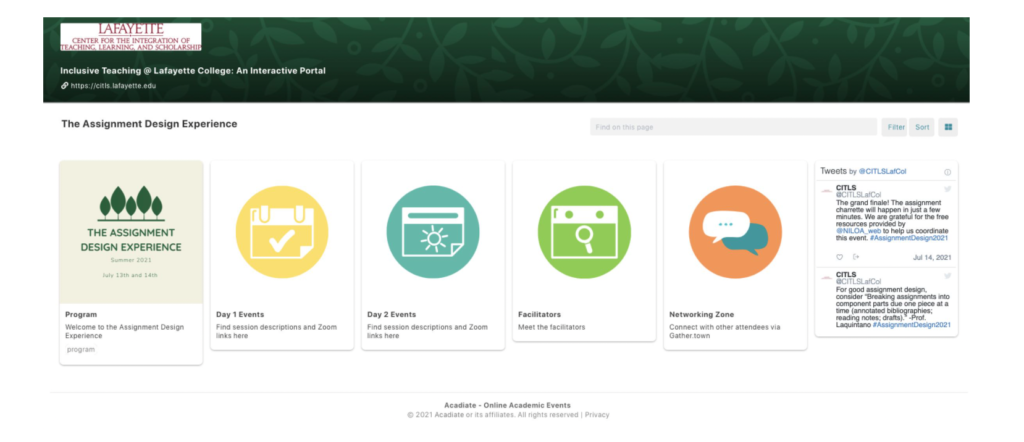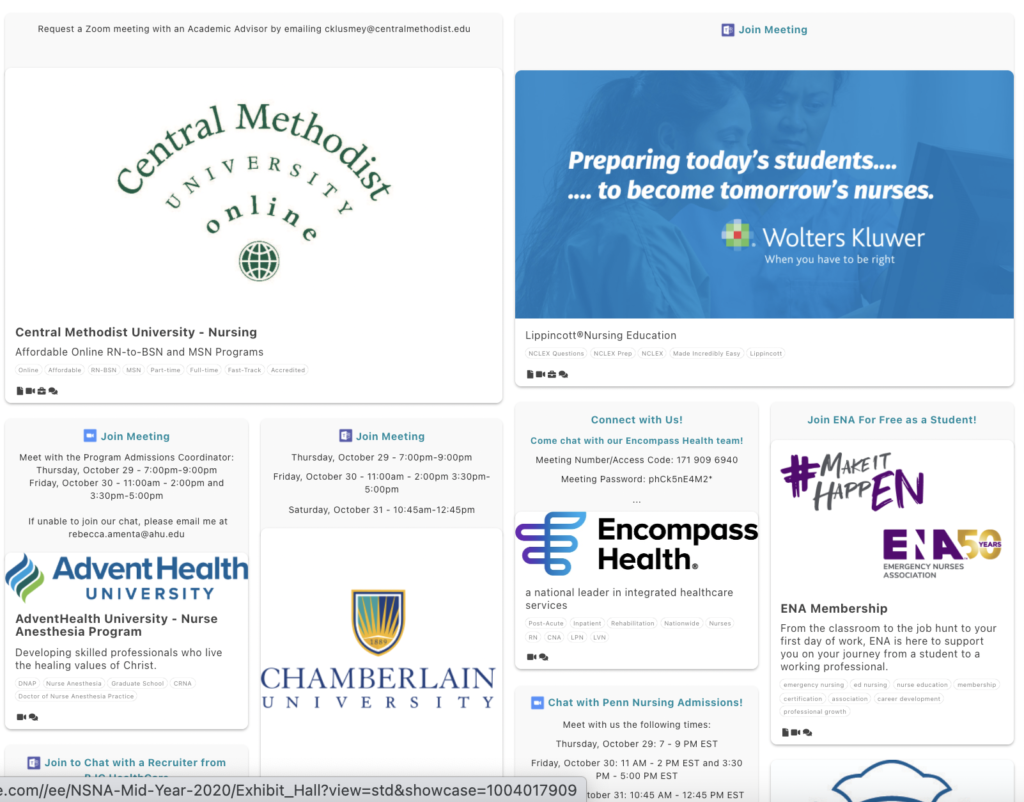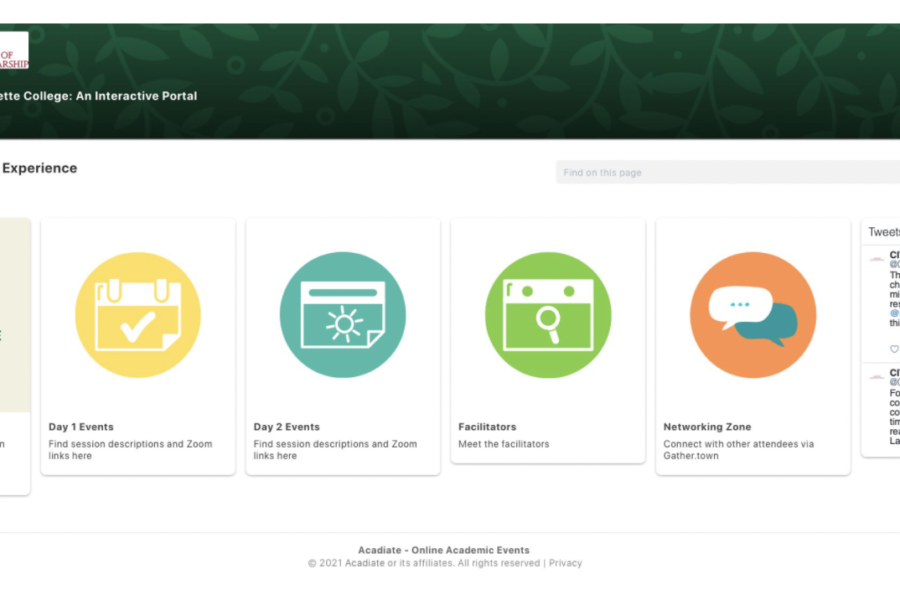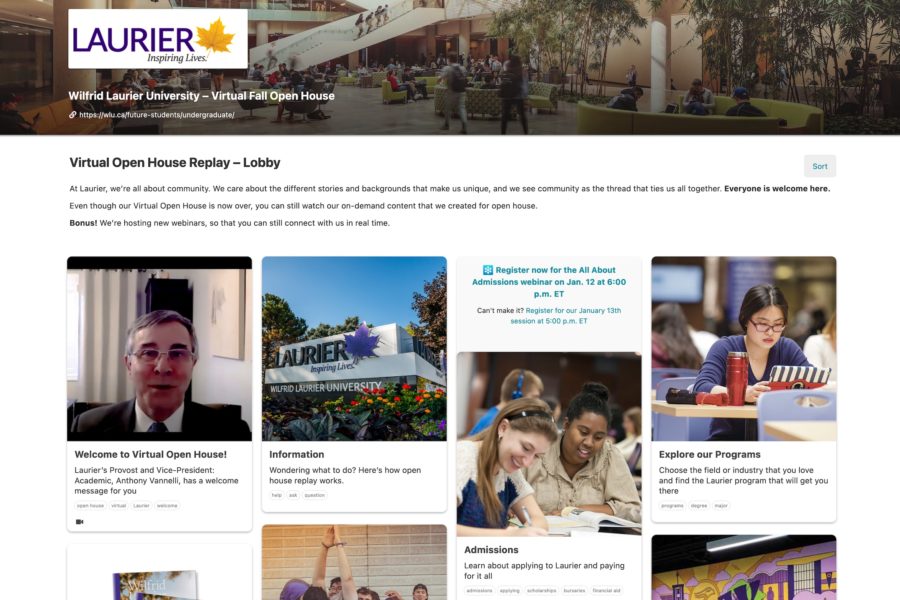Most people have missed the excitement and energy of in-person events over the last year. We have watched as event organizers across many different industries scramble to find ways to recreate as best as possible the in-person experiences we all miss. There has been a great deal of innovation across a wide gamut of online event platform styles or special features to emulate in-person experiences or provide enhanced experiences that are possible with digital technologies. This innovation has brought many different perspectives and opinions on what makes up a fantastic online event and the perceived benefits and drawbacks.
Some people love the time savings from scheduling efficiencies that online events provide. Others feel that online events will never match the energy and richness of relationships created at in-person events. Whatever your current view of online events, we believe it is short-sighted to see them as mutually exclusive from in-person events and that it is a simple choice between one or the other.
Every event organizer should consider how to deliver a superior experience for attendees by marrying the two together. There are many economic benefits to be gained for event organizers.
The idea of merging an online and in-person event is often called a “hybrid” event. There are many reasons to consider taking the hybrid event approach to your next event, whether an entire conference or a mini-event. As we speak, hybrid events are being defined differently as every event’s use of in-person and online experiences will be different. But as we discuss the possibilities with clients, it becomes clear that hybrid is a real possibility driven by the event organizer’s resources and preferences.
We are involved in many different online events for higher education institutions, such as open houses, orientation week, career fairs, furthering education fairs, school club fairs, specialty-themed events, poster research, etc. The priority is student engagement and access. Still, we are also working with many associations where revenue generation and sponsorship access are vital drivers. The principle remains the same in delivering more value to a broader group of constituents as possible in an uncertain health environment.
This article is meant to help event organizers better understand the benefits and the options for hybrid events as the return to in-person events is spotty and risky. We are having more discussions with event planners who went virtual with limited success or poor experiences. Some patched together their online events using only web conferencing software, and others used another online event platform not well designed for their type of event. Many feel pressure to return to in-person events but realize that in-person is still premature or very risky.
In the short term, hybrid is a better fit for those planning in-person but are at risk of cancellation. When you think of the benefits in a broader holistic view, Hybrid events are the future.
Reason 1: Increased Accessibility & Engagement
One of the most significant limiting factors of in-person events is that they are often limited to narrow time periods and geographic places. In today’s world of ubiquitous computing and high-speed 5G mobile data connectivity, most people have computers at their homes and smartphones in their pockets; they can realistically attend events from anywhere there is an internet connection. This newfound level of access is a game-changer for event planners. It means event attendees are no longer constrained by geographic location or restricted by schedules and that digital experiences can be layered on top of in-person experiences to enhance and expand connectivity and engagement. In turn, it delivers more value to all.
Online access enables a much wider group of individuals who can participate in online events that in the past could not. A client school program that ran an online event advised us that they measured 3X more attendance than the previous in-person event from last year because students from other campuses could participate. One-click access to an event is a game-changer for events because it provides groups who previously would have never given an event a chance an opportunity to drop in and see what it’s all about.
They also measured 2X greater engagement by the number of requests for a co-curricular record credit from attendees. Because of increased attendance and engagement, the ROI was compelling enough to decide that all future events would be hybrid.
Another example is for associations running online conferences. They can set up a virtual exhibit hall for vendors with separate dates and times from the in-person exhibit hall to schedule different access periods for paid attendees. Traditionally, traffic to the exhibit hall would be from paid attendees; however, an online exhibit can enable free access to the broader association membership at select times. Opening access benefits the membership with free, highly valued access to some aspects of the conference, which can serve as a marketing vehicle for more individuals to register. This approach can also provide vendors with an unprecedented value from substantially greater exposure and results in higher engagement and leads. Adding online event layers enables much greater options to create value for wider audiences not possible in pure in-person events.
Reason 2: Greater Revenue Retention
Many groups depend on the revenue they generate via events. Many people forget that cancelling an in-person event is far more than just losing revenue; it usually also means losing deposits and down payments for in-person overheads such as physical event space, catering, IT support, and more. With all these costs, the ability to retain the revenue, whether from attendees, exhibitors, sponsors, or funders, becomes even more critical to prevent event organizers from going into the red.
What are the chances for cancellation for the in-person event, and what is the backup if it happens? For Associations, this is maybe the most prominent issue keeping their executives up at night. With our clients, we help them plan out a realistic vision of a hybrid event, so they gain the benefits of both modalities for attendees and get the safety net of shifting the entire event online on a contingency of in-person cancellation. Of course, this needs to be prepared for in advance with this written into the sponsor and exhibitor agreements.
There is always an option that fits a vendor’s needs or resources. An example with a client is setting up both an exhibitor hall in-person and virtually. The organizer offsets the online component by four days from the in-person, so vendor staff do not need to manage their in-person and online booths simultaneously. So access is available to attendees who choose the in-person option during that week, and those who only choose the online portion have access the following week. The beauty of this structure is that vendors can always staff their online booths with synchronous web software or use asynchronous communication options with chat, comments, or scheduling software. This approach protects the organizer if the event needs to be cancelled, they have an online backup, and the vendor can revert to the online option if they need to cancel their in-person attendance.
Planning your event as a hybrid allows you to set expectations for all constituents so that they know that their participation (and the revenue they bring) is not contingent on attending in person. Some event planners may not feel this applies to them; they may be running an event for students where the institution covers the cost and owns the building space, so the cost associated with cancelling is not as obvious. However, institutions plan out and execute events for students to enhance learning experiences or opportunities to be engaged in their campus community. Expanding the value and accessibility of events with hybrid solutions can prove vital in student retention. Otherwise, why run them?
Reason 3: New Revenue Generation Opportunities
The goal of any event is to create value, value for students, attendees, speakers, vendors, and the organizer. The great thing about hybrid events is it allows event organizers to create value in brand new spaces and enhanced experiences. Online events will enable you to scale potential revenue much more efficiently or create new revenue streams not possible with purely in-person events. You don’t have to restrict your attendee capacity based on physical space, and you don’t have to confine your audience to those who have the time and money to attend physically or at a particular time. As an event organizer, you now have access to virtually unlimited space for attracting more attendees, with the only real barrier to entry being interest in your event and an internet connection.
This same benefit applies to vendors. Attending in-person events may be very costly, especially when considering flight, hotels, personnel, booth materials that need to be shipped, and meals. For vendors located far away, this may negatively tip the scales on the value your in-person event provides. An online option can enable you to give some vendors a more attractive value proposition for their unique situations. It can also be a viable option for vendors committed to another in-person event but don’t want to miss out on the attendees at your event.
An example of additional revenue generation made possible with a hybrid component is recording all the talks and workshops and packaging them in the online space for access after the “live” portion of the event ends. Organizers recorded the speaker talks and added them to the event for on-demand access. The client then sold access post-event at a discount and generated substantial incremental revenue.
Reason 4: Create Greater Value for Speakers, Exhibitors, and more.
The primary driver of event value for speakers, exhibitors, sponsors, partners, and media is how many people an event attracts in a given target market. The ability to dramatically increase your attendance numbers bolsters the overall value of your event. It will allow you to increase the revenue you pull from sponsors and exhibitors and raise the profile of speakers your event can attract. All these, in turn, bolster the value you can provide to your attendees.
Online also gives you a unique ability to open up areas of your event for far greater traffic than you could ever have in person. For example, you can make it available to more than just event registrants with an online exhibit hall. You can open up to your entire membership or your entire email list, which may generate more than 10X the traffic than your registrants would for exhibitors. The great thing about this is that you can also use an online exhibit hall to get more people interested in the event. In the same fashion, you can choose to make some elements (talks, keynotes, and more) of your event ‘free’ to generate more buzz and create new pathways to greater registrants.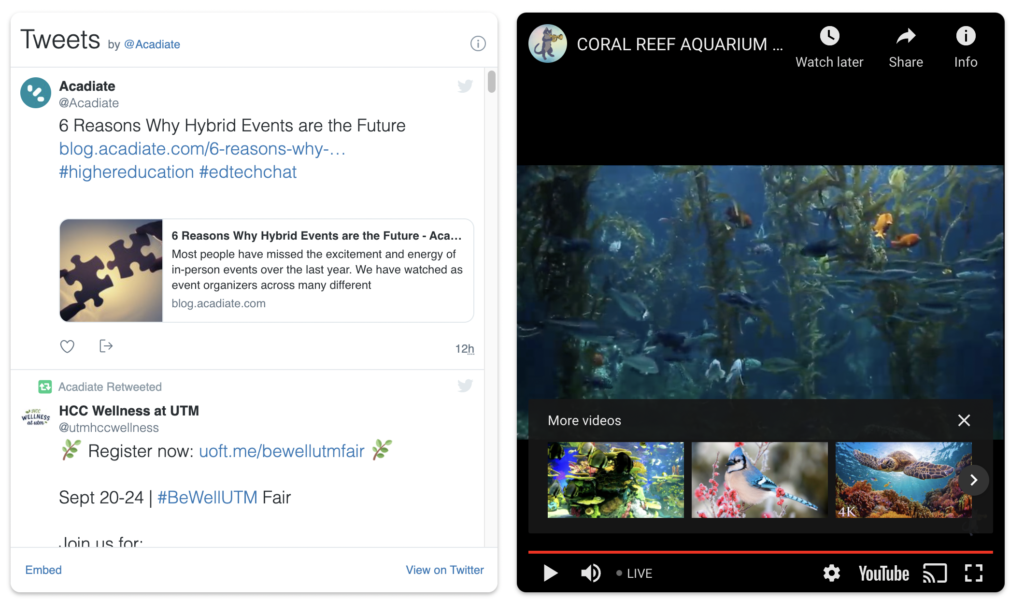
The beauty of hybrid is the possibility to marry the attendees’ experiences between the two spaces. Hybrid enables online attendees to experience more in-person event elements with live streams and recordings of the in-person experience. On the other hand, hybrid enables in-person attendees to tie in more seamlessly to the online components of the event, for example, more convenient access to event social media, feedback surveys, online games and more. It also enables in-person attendees to access the online optimized spaces through their phones as an event companion and access areas better suited for online events such as networking zones, virtual poster research, and more.
Reason 5: Deliver Greater Pre / Post-event Value
Hybrid events can have a much longer footprint. You can use the online environment to prepare your in-person attendees better for the in-person event. You can also use the online environment to give in-person attendees a superior post-event experience by loading up event content to access after leaving the event. This post-event access can help attendees better realize the value the event offered; allow them to relive their favourite talks, see talks they missed, and more.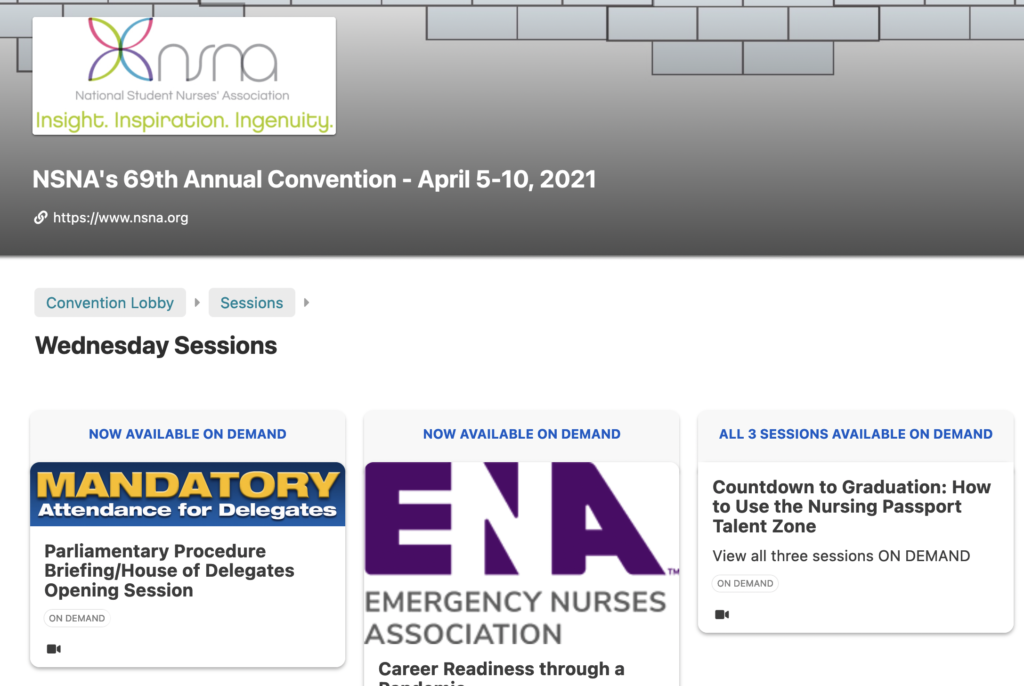
This increased engagement opens unique opportunities for sponsors and exhibitors. Instead of exhibitors only having access to attendees for a few days, they can now have access for months. You can also create additional sponsor value by allowing sponsors to play a more significant role in pre and post-event elements. For example, “Post-event access made possible by ABC Company.”
Also, online events provide deeper metrics and analytics on traffic flows that help justify sponsorships and ROI calculations. We are seeing some sponsors for conferences reallocating marketing ad spend from social media marketing to such virtual and hybrid events because of the higher quality of target marketing available in these digital spaces.
Reason 6: Greater Safety and Insurance
The pandemic and its restrictions have left many event organizers flat-footed over the last year – forcing the cancellation of an immeasurable amount of events throughout 2020 and 2021. It is hard to contemplate the long-term implications of all these cancelled events. The lost opportunities and experiences, the relationships never created, and the learning outcomes never realized or compromised.
As the pandemic progressed, event organizers learned about new and exciting ways to get their events online and provide value to their constituents. At the pandemic’s start, attendees forgave organizations for cancelling events because online events were such a green space. However, now that we are more than a year into the pandemic, attendees now have a reasonable expectation that organizers have an online contingency in place. Hybrid events mean that you have the infrastructure to support both the benefits of in-person and online events and ensure the event will occur with greater assurance.
Event organizers need to be prepared that even if you run your event in-person does not mean the return of the same number of attendees. Some clients already see dramatically fewer sign-ups for their in-person events forecasting 30-70% drops. We are also being told of great concern that speakers are also starting to cancel because they are changing their minds on the safety of in-person attendance or their organization is not letting them travel. So in-person events face a great deal of risk from the cancellation or reduced numbers of attendees or speakers wanting to shift online. Having an online component enables an event organizer to accommodate the speaker online and not compromise the content or value of the event to attendees or sponsors.
The promise of hybrid events should be exciting to every event organizer. It is a massive opportunity to deliver unprecedented event value to all event constituents. Increasingly attendees, exhibitors, speakers, and more will propel hybrid events in the future because it provides new levels of flexibility, scalability, reliability, and security to events.
Of course, there will be detractors who believe that there is nothing like the in-person event experience, and there is some truth for certain types of events if you compare it to a strictly online experience. However, it is difficult to argue against hybrid events because they potentially provide the best of both worlds. A true synergy where the whole is much greater than the sum of its parts.
Find out more about running a hybrid event or conference.


